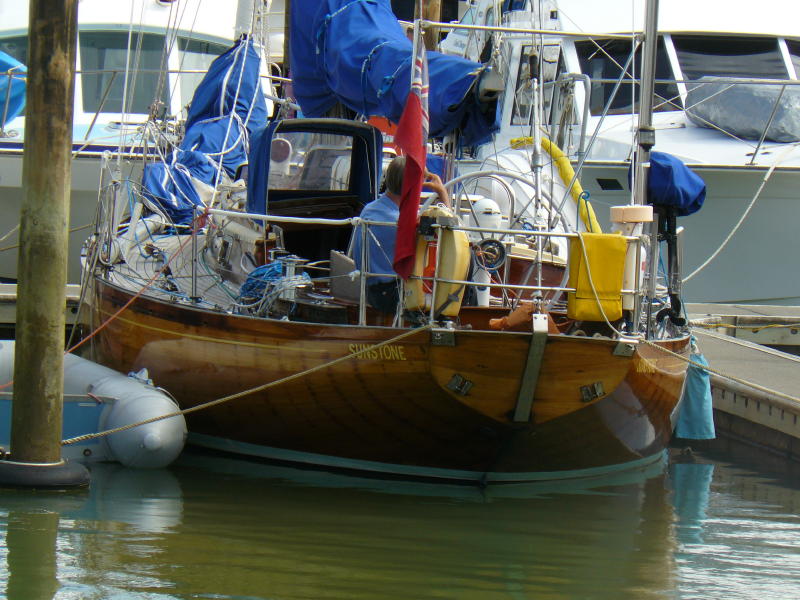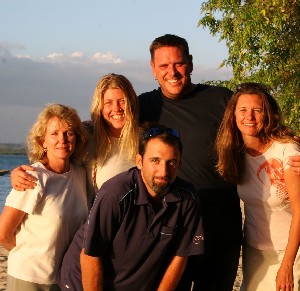New Zealand - Second Time

JJMoon Diary
Barry and Margaret Wilmshurst
Mon 3 Nov 2008 09:46
|
We arrived back on
to Opua's quarantine berth at 0030 on Thursday 26th, and very
quiet it was too. Not a lot goes on in northern New Zealand just
after midnight so we were not so full of excitement as we were last year.
Nevertheless we were conscious that we had had a wonderful season up in the
islands and it felt great to be "home" and in familiar
surroundings. We had a good cup of tea.
It was even better in the morning.
Everyone, from Gary the lugubrious Customs officer, Mike from MAFF
through the marina office staff to the various tradesmen and chandlers
seemed delighted to see us. The chandlers seemed particularly pleased
that we were back; we could see their cash registers whirring in their
eyes. Within a few hours we had recovered our car, renewed our AA
subscription, opened a New Zealand bank account and instigated opening moves
with various engineers, sailmakers, electricians, electronics wizards,
upholsterers and car mechanics. There should not be so much to do this
year but now is a fairly slack time for the local businesses and we want to get
on to their schedules. We have spent part of the past week researching
bits and pieces on the wish list. Mags has returned to church and yoga and
we have had some good meals in the local restaurant and the Opua Cruising
Club. We spent Friday evening at the club with Tom and Vicky Jackson from
Sunstone, currently perhaps the best known of British cruising couples
through their prolific articles in the yachting press about adventurous life on
their beautiful, varnished 40ft Sparkman and Stephens ocean racer from the
1960s.
 Sunstone, a beautiful
varnished 40ft Sparkman and Stephens ocean racer from the 1960s owned by Vicky
and Tom Jackson
The passage down from Noumea was
easier than some; we had moderate to light headwinds all the way and did a good
deal of motoring and motor-sailing. Some boats opted to call in at Norfolk
Island to rest in one of the bays for a night or two but we decided to do
the whole passage in one hop - once we were on our way we did not fancy relaxing
and then having to get keyed up for another four days. About half
way, on a long tack west to east we passed about twenty miles north of the
island and we could hear VHF radio chat from the boats in the bay.
We suddenly became aware of a station calling "sailing vessel passing north of
Norfolk Island". Could it be us, twenty miles away? It was.
Wildwatch could see us on the horizon and would we kindly keep a good look-out
for some whales that had been seen in our area? We readily agreed to do so
but, given our record, it was no surprise when the whales failed to
materialise. Immediately after this exchange Norfolk Island Customs came
up. Were we intending to call in? Would we give them our
details? Twenty Miles? There is no hiding place!
We had our usual trouble with water in
the boat; this time it came from inside. Due to an amateur plumbing
mistake the water tank let go - twice - depositing 350 litres of fresh water
into the bilge each time. Another fine mess! The bilge pumps and
water-maker did some extra work and we were soon topped up. Another small
problem arose when one of the fuel tank senders failed and we couldn't tell how
much fuel we had left. This was a bit unsettling as we did not want to
find ourselves in a flat calm a hundred miles out with no fuel. We managed
to resolve that one too.
New Zealand officials at ports of entry
are correct but generally easy to deal with. In Opua they even take
responsibility for handing each incoming boat a basket of little marketing
goodies and a binder with details of the local businesses. Still, it is a
bit different from what we are used to in Europe. The first thing we
noticed, as soon as we had crossed the Atlantic, was that nobody would let you
in unless you had a formal clearance document from your previous port.
Whether boats would actually be turned back out to sea without it I don't
know, but every immigration official seems to put great store by this piece
of paper. A greater nuisance in this part of the world is food that
might be contaminated with bugs or bacteria. The rules vary from country
to country and it isn't obvious before you arrive what will be taken off
you. Honey is a certainty. Apparently bees can easily be infected
with serious disease and all honey will be confiscated without fail. We
understand that in Australia you cannot even cross state boundaries with a pot
of honey. An additional problem is tit-for-tat retaliation between
countries. New Zealand has banned something from New Caledonia and in
return no New Zealand capsicum is allowed in by the French. Or it might be
the other way round. The business can be quite distressing. Food in
New Zealand is very good, particularly the meat and there is a temptation to
stock up before leaving. We heard of one boat last April which arrived in
Noumea to have a large freezerful confiscated. The woman was seen on
the marina pontoon in tears. We are old hands now and made sure that our
stocks were running low when we arrived. Mike from MAFF is an amiable man
but he was not too busy early on Thursday morning and he gave us a thorough
going over, looking into all lockers that Mags owned up to containing
food. We didn't lose too much and he took our accumulated rubbish ashore
with him so we parted with a smile and a handshake. In smaller countries
things are not always so straightforward. The word among yachties is
that some officials take confiscated food straight home to their wives.
These libellous rumours remain unconfirmed.
 In the last few days we have heard a sad tale (with heroic overtones)
pertinent to the paragraph in the last blog about the dangers of
coral. Assiduous readers will remember the yacht Timella and her crew, our
story of towing them into Bora Bora with engine trouble last year and
the false alarm during their passage to Rarotonga when a full scale search
and rescue operation was instigated unnecessarily. Timella's crew left the
boat in the Cook Islands and flew to Australia where
skipper Cameron soon found a job. Sadly, the couple split up and
Sharon and Lewis returned to Scotland. This year Cameron returned to
Rarotonga to collect the boat and, while there, he found a new crew.
On Sunday 12th October they ran on to a small submerged reef about twenty
miles south of Viti Levu, Fiji's largest island. Timella was
wrecked, her dinghy was holed and her crew were in the water
for several hours. The Fijian authorities tried
hard but never managed to find sufficient fuel to mount a rescue
attempt. Fortunately the mayday call was heard by an American
couple with two small children anchored in a lagoon about twelve miles
away. With invaluable help from the New Zealand High Commission
in Fiji and the Rescue Coordination Centre New
Zealand they carried out a very courageous and skilful
rescue. We were sad indeed to read about the loss of Timella and, perhaps
because we know the boat and its skipper quite well, we find the
blow-by-blow account of the rescue by Maurice and Sophie Conti about the most
dramatic piece of yachting writing we have read. It can be found
with a good press report, a short account by one of Timella's crew and some
pictures from the Southland Times at the links below. You will not be
disappointed; if we have done nothing else in these blogs but introduce you to
this rescue account, it will have been worthwhile! Open the press
report and find the further link to Maurice Conti's detailed log a little way
down on the right. The incident started with further engine trouble on
Timella and in trying to carry out repairs Cameron was badly
scalded. It is still not clear how they found themselves on the reef,
which is surrounded by deep water and is seven miles from the nearest point of
danger; perhaps they were distracted by Cameron's injuries. In the last few days we have heard a sad tale (with heroic overtones)
pertinent to the paragraph in the last blog about the dangers of
coral. Assiduous readers will remember the yacht Timella and her crew, our
story of towing them into Bora Bora with engine trouble last year and
the false alarm during their passage to Rarotonga when a full scale search
and rescue operation was instigated unnecessarily. Timella's crew left the
boat in the Cook Islands and flew to Australia where
skipper Cameron soon found a job. Sadly, the couple split up and
Sharon and Lewis returned to Scotland. This year Cameron returned to
Rarotonga to collect the boat and, while there, he found a new crew.
On Sunday 12th October they ran on to a small submerged reef about twenty
miles south of Viti Levu, Fiji's largest island. Timella was
wrecked, her dinghy was holed and her crew were in the water
for several hours. The Fijian authorities tried
hard but never managed to find sufficient fuel to mount a rescue
attempt. Fortunately the mayday call was heard by an American
couple with two small children anchored in a lagoon about twelve miles
away. With invaluable help from the New Zealand High Commission
in Fiji and the Rescue Coordination Centre New
Zealand they carried out a very courageous and skilful
rescue. We were sad indeed to read about the loss of Timella and, perhaps
because we know the boat and its skipper quite well, we find the
blow-by-blow account of the rescue by Maurice and Sophie Conti about the most
dramatic piece of yachting writing we have read. It can be found
with a good press report, a short account by one of Timella's crew and some
pictures from the Southland Times at the links below. You will not be
disappointed; if we have done nothing else in these blogs but introduce you to
this rescue account, it will have been worthwhile! Open the press
report and find the further link to Maurice Conti's detailed log a little way
down on the right. The incident started with further engine trouble on
Timella and in trying to carry out repairs Cameron was badly
scalded. It is still not clear how they found themselves on the reef,
which is surrounded by deep water and is seven miles from the nearest point of
danger; perhaps they were distracted by Cameron's injuries.
Next Saturday we are going to leave all
this excitement behind and return to Europe for six weeks. We are
returning to New Zealand via Perth where we are greatly looking forward to
spending Christmas with Ross and Sue from Y-Not and their family. We hope
to be back in Opua about the turn of the year. Best wishes and Happy
Christmas!
|